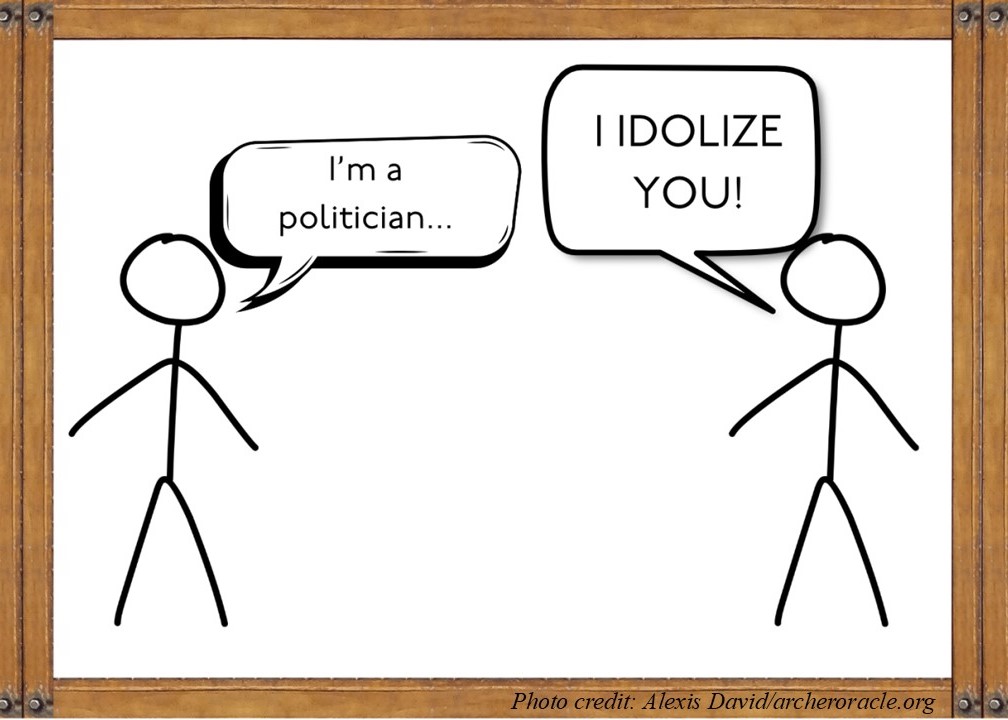In the murky waters of political influence, where ambition and deceit swim hand in hand, the temptation to revere those in power is a treacherous trap. Idolising these leaders is akin to entrusting the keys to the kingdom to charlatans, whose sweet words mask sinister intentions. The siren song of their authority resonates with a dangerous charm, luring the masses into a false sense of security. In this high-stakes game, the cost of misplaced loyalty is a society ensnared in the very web of manipulation it sought to escape.
By Themba Khumalo
We have all been there at some point — being swept up by the silver-tongued orator, the glowing promises, the seductive dream of a utopia just around the corner.
It is all too easy to fall head over heels for a political figure, to see them as a messiah, a true advocate for the masses. But lurking beneath that polished veneer is a brutal truth: politics is a business, and politicians are merely actors in a grand performance. To elevate them beyond this role, to idolise them, is akin to being duped by a con artist’s honeyed words… a dangerously alluring mirage that distracts from the grim reality lurking just out of sight.
Holding a politician in high esteem is much like entertaining the notion that a stripper has any real affection for you. This comparison, while perhaps a touch vulgar, effectively brings to light a significant insight.
Just as the stripper meticulously designs an experience to provoke certain reactions—admiration, desire, and, inevitably, financial gain—politicians are engaged in the delicate art of shaping their public personas and narratives to attract support, secure votes, and ultimately consolidate power. They skillfully articulate the hopes and frustrations of the masses, yet their primary aim is rarely one of altruism. It is, at its core, a relentless chase for influence and control.
The treacherous abyss of unquestioning loyalty, where politicians are worshipped as infallible icons, invariably wreaks havoc, leaving a trail of personal despair and national disarray.
The moment we shift from conscious engagement to a frenzied adoration of political figures, a torrent of issues erupts, exposing the dangers of surrendering our critical faculties to the whims of charismatic authority.
When you elevate a political leader to the status of a deity, you effectively obliterate your capacity for critical thought. This idol worship fosters a toxic cognitive bias, rendering you incapable of questioning their dubious actions. Any voice of dissent is quickly dismissed as “fake news” or partisan nonsense, creating a stifling echo chamber where accountability is not just ignored but actively murdered. It’s a disheartening reality, watching reason crumble under the weight of blind allegiance.
It’s utterly ridiculous how we coddle our political leaders, forgiving their flaws with a fervour that would make a saint blush. A stupid mistake is transformed into something “charming,” a scandal that would obliterate anyone else’s reputation is dismissed as “overblown,” and a promise shattered is just “a necessary evil of politics.”
We have become so enamoured with these figures that we have lost all sense of accountability, allowing them to skate by while we’d never tolerate such nonsense from anyone else.
The cult of political idolisation is a cancer that festers in our society, forcing us to define ourselves by our chosen heroes rather than the principles that should unite us. This creates a chasm so wide that it demonises anyone who dares to disagree, rendering any hope for constructive dialogue a distant fantasy.
It is a tragic farce of “us versus them,” where genuine policy discussions are sacrificed on the altar of loyalty.
When the idolised politician crashes and burns in a spectacular display of incompetence, the façade crumbles, revealing the hollow core beneath. The followers, once starry-eyed and fervent, are left reeling in the wake of this catastrophic failure. Disillusionment seeps into their bones, turning fervour into bitter apathy, as they turn their backs on the political circus that has betrayed them so profoundly.
How on earth do we traverse this treacherous political terrain without succumbing to the sickening temptation of idol worship?
First off, let us ditch the obsession with personalities. Politicians should be judged by their actual deeds and policy proposals, not their ability to charm a crowd or deliver a speech that could make a rock weep.
Next, let us cultivate a healthy dose of scepticism. Question everything, because if you don’t, you might as well be handing over your brain on a silver platter. Verify facts from multiple sources and steer clear of anyone who demands your blind allegiance.
And for heaven’s sake, embrace the complexity of it all!
Politics is a murky swamp, not a simple game of black and white. Even those politicians you think are your allies can have their own skeletons; while those you oppose might actually have a point worth considering.
Get involved! Don’t just sit there like a mindless drone. Educate yourself, engage in meaningful discussions, and make sure those elected officials know they are accountable to you. And let us not forget: these politicians are supposed to be our servants, not our idols. They are here to represent us, not to bask in our adoration.
Ultimately, a healthy democracy is only as strong as its citizens, who must be active and engaged, wielding critical thinking like a shield against the mindless adoration of those in power. Let us not delude ourselves—politicians are just as flawed and human as the rest of us. By concentrating on real policies, demanding accountability from our elected officials, and maintaining a heavy dose of scepticism, we can cultivate a political system that is genuinely just and effective.
True power does not rest with the individuals on the stage, but rather in the collective voice of an informed and engaged citizenry. It is time we stop treating these politicians like they are untouchable icons and start recognising them for what they are: our public servants, not our idols.


